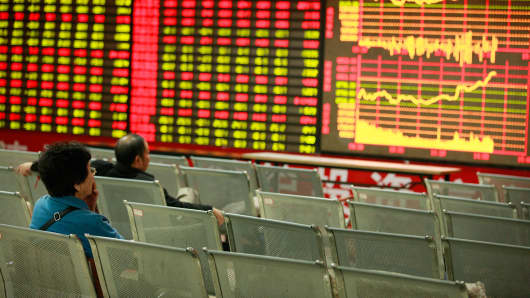China's stock market, which has shed 60 percent of its value since a 2007 peak, is once again languishing at 3-1/2 year lows and nothing it seems can push this market out of a rut, said analysts.
Hopes that China's new leadership would usher in reforms to boost the economy lifted the market 5 percent between early September and early October. But that rally fizzled fast, even as last week's announcement on the line-up of China's new leadersended one big uncertainty hanging over the stock market for months.
News on Thursday that the HSBC Flash Purchasing Managers' Index for China hit a 13-month high in November, showing the manufacturing sector is in expansion mode, also failed to lift sentiment. The benchmark Shanghai Composite Index was down 0.5 percent by mid-day in Asia, while regional markets notched up strong gains.
Now, analysts say it may take years for the Chinese stock market to work its way out of this prolonged funk. It is not the economy, they say, but how companies are faring that matters.
"The story on earnings is still quite questionable," Adrian Mowat, chief Asian and emerging markets equity strategist with JP Morgan Securities in Hong Kong, told CNBC Asia's "Squawk Box".
"In China, although there's growing optimism when people talk about the economy… when we look at the profitability of Chinese businesses, it continues to go down. And as we look into 2013, there are still challenges to the profitability and (investors') expectations," he added.
Bad Debt to Blame?
Mikio Kumada, global strategist with LGT Capital Management in Singapore, says that one reason why the market is unlikely to bounce back any time soon is bad debt, which is expected to plague companies' finances for months, if not years, to come.
"I think it would take time because there's too much bad debt in the system and that needs to be recognized," said Kumada. "This credit bubble was created by the last major stimulus in 2009 so another set of stimulus is just not going to work."
(Read more: Will China's New Leadership Usher Bull Run for Stocks?)
China's overall corporate debt levels are expected to rise to 122 percent of gross domestic product by the end of this year, up from 108 percent last year, Reuters reported this week, citing data from Beijing-based consultancy GaveKal-Dragonomics.
Much of this increase in debt was caused by the massive four trillion yuan ($642 billion) stimulus which the Chinese government pumped into the economy in November 2008 to minimize the impact of the global financial crisis. A lot of this money was injected via banks, which in turn directed lending to state enterprises and other projects that could ultimately go sour.
(Read more: As Growth Flags, China Shies From Stimulus)
The bad debts in the system could also be much higher than the official 0.9 percent cited by the central bank and that means it could be some time before they work their way through the system, Kumada said.
"The big unknown now in China will be whether this will take a few quarters, a few months or a few years," he added.
(Read more: China Economy Recovering, Bad Debt Risks Dismissed)
Retail Investors Burnt
And while economic data suggest a rebound in the Chinese economy, which has slowed for seven straight quarters, retail investors may be looking for much stronger signs before they are willing to dip their toes back into the market.
In addition to Thursday's upbeat HSBC PMI numbers, China's exports rose 11.6 percent in October from a year earlier to a five-month high, while industrial output rose a stronger-than-expected 9.6 percent in October from the year before.
"The PMI numbers are positive and shows the economy is very slowly improving, but I think that the recovery in the economy is not yet strong enough to convince local investors to buy in," said Phillip Chan, director of Shenyin Wanguo Securities in Hong Kong.
Retail investors account for around 80 percentof the turnover at China's two stock exchanges in Shanghai and Shenzhen, and for the market to rebound, these investors will have to tread back in again.
But these investors are increasingly defecting the market after seeing no improvement for several years, says JPMorgan's Mowat. Most investors have been burnt, especially those who first started trading when the Composite Index was approaching its peak in 2007, only to see the market crash.
"Unfortunately for the mainland markets, you saw huge account openings in terms of brokerage accounts when the index was around 6,000," Mowat said. "Those with money probably have a bad experience in Chinese equities. And it's going to be very difficult to reignite an equity culture there," he added.
—By CNBC's Jean Chua.


